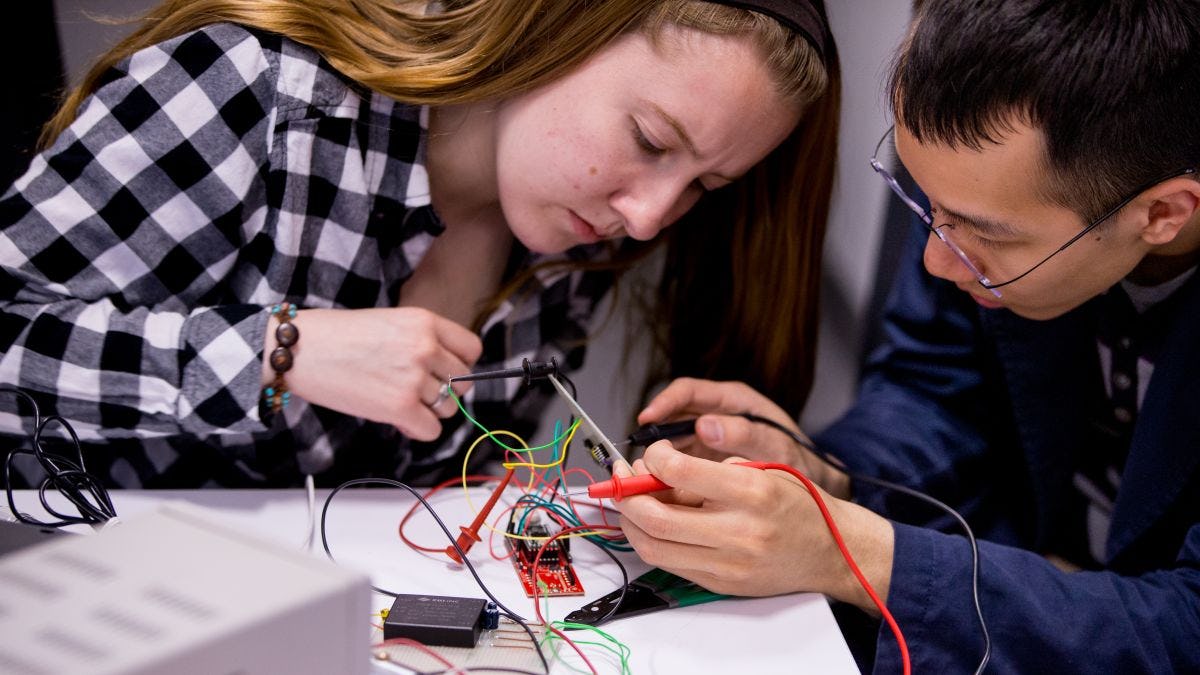
Ph.D. in Computer Engineering | Stevens Institute of Technology
Program Details
Degree
Doctor of PhilosophyDepartment
Electrical and Computer EngineeringAvailable
On campusGain the in-demand computer engineering skills you need to lead in rapidly evolving fields like cybersecurity, the Internet of Things (IoT), machine learning, and artificial intelligence (AI).
In the Stevens computer engineering Ph.D. program, you’ll develop a strong repertoire of knowledge and techniques, learning to develop models, algorithms and architectures and using them to solve a variety of challenges. Then, you’ll apply that expertise alongside faculty innovators who are advancing the principles and practices that enable today’s complex computer hardware, software, digital, electronics and wireless communications systems. All the while, you’ll have access to state-of-the-art facilities such as the HUDSONLab, which focuses on fundamental challenges in chip design, data science, AI and IoT, and the AISecLab, which focuses on analytics and information security for complex systems.
The Department of Electrical and Computer Engineering offers dynamic opportunities to explore leading-edge research within a close community of faculty mentors. You'll be able to study under a faculty mentor in the area that you find most exciting:
Wireless Communications and Mobile Computing
Information Systems and Cybersecurity
Cognitive Radio Networks and Spectrum Management
Data Analytics
Internet of Things
Blockchain Technology
Applied Artificial Intelligence
The Stevens Advantage: Widen Your Career Options
Stevens computer engineering Ph.D. graduates are highly regarded in academia, with many alumni going on to careers as research fellows and faculty at other institutions. Additionally, Stevens’ proximity to New York City offers ample opportunities for networking in fields like technology, telecommunications, defense, consulting, finance and government.
Learn more about what makes graduate education from Stevens a unique experience:
Graduate Cooperative Education Program: Available with two tracks, your co-op experience can serve as a starting point for a research project or augment your on-campus research with complimentary experience.
International Student Experience: Tap into our expanding worldwide network of research, academic and alumni partners and mentor with our expert faculty in a number of federally-designated STEM degree programs. Optional Practical Training (OPT) or Curricular Practical Training (CPT) is available to gain work experience in your major/field of study.
State-of-the-Art Research Labs and Facilities: Build, tinker and test your designs in Stevens' MakerCenter, Prototype and Object Fabrication Lab, or numerous other research facilities.
Research Opportunities: Renowned faculty, labs and research centers – as well as industry partnerships and funding from leading national agencies – support strategic and interdisciplinary research in engineering and science.
Assistantships and Fellowships: Stevens offers funding to select graduate students in the form of teaching assistantships, research assistantships and fellowships. Limited in number, these highly competitive opportunities are awarded to exceptional candidates based on merit.
Expanded Learning Options: The Schaefer School offers new opportunities for doctoral students to do coursework at universities in the New York City area – and around the world – through our growing list of academic partnerships with other prestigious universities. Learn more about our latest partnerships.
Hands-On Electrical and Computer Engineering Research
At Stevens, you have the ability to join research groups with students at a variety of levels of experience, and outstanding faculty so you can learn cutting-edge technology as a team, just like in the real-world. In our state-of-the-art research labs and facilities, you'll have the opportunity to engage in experiential learning.
Program Admission Requirements
Who Should Apply?
We welcome applicants with a master’s degree in electrical or computer engineering (up to 30 credits may be transferred to Stevens’ Ph.D. program). Applicants carrying a GPA of 3.5 or higher are preferred.
Exceptionally well-qualified applicants with a bachelor’s degree in electrical and computer engineering and a background that demonstrates the potential to perform independent research may be considered for direct admission to the Ph.D. program.
Requirements
Bachelor’s degree, with a minimum GPA of 3.5, from an accredited institution
Official college transcripts
Two letters of recommendation
Resume or curriculum vitae
A statement of purpose
For international students: An excellent TOEFL/IELTS score
A competitive GRE or GMAT score (optional)
Writing sample (such as journal or conference publication, thesis, or research reports)
Curriculum Overview
View objectives, outcomes, and other Ph.D. curriculum details in the most recent academic catalog.
View Academic Catalog >
Each Ph.D. curriculum must also adhere to the institution wide standards listed in the doctoral handbook.
View Doctoral Handbook >
If you have existing graduate credits or experience in this area of study, contact [email protected] to discuss opportunities to include it in the curriculum.
Fellowships & Assistantships
Information about assistantships and fellowships can be found here.
STEM Designated Degree Programs
The four fields comprising STEM – science, technology, engineering and mathematics – offer a wide variety of professions that are classified as some of the highest-growing and highest-paying jobs right now and in the future.
And for international students, the demand for STEM-related professionals in the United States can open the door for an extended stay.
An ever-growing list of eligible programs across all levels is available here.
A Tech Forward Education
Computer Engineering Ph.D. Facts & Statistics
Related Programs
Ph.D. in Computer Science
Prepare to make an enduring impact in fields like machine learning, artificial intelligence and cybersecurity with a Ph.D. in computer science from Stevens.
Mechanical Engineering Doctoral Program
Gain industry-leading expertise in robotics, bioengineering, nanomaterials, sustainable energy systems and more with a Ph.D. from Stevens.
Robotics Doctoral Program
Earn your robotics Ph.D. and gain in-demand skills that can make a global impact while learning from top robotics experts.


